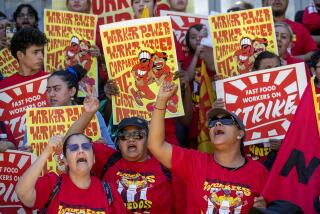Workers Fear Job Loss, Assail Tobacco Bill
- Share via
RICHMOND, Va. — Hundreds of tobacco industry workers fearful of losing well-paying jobs added their voices Thursday to protests over a foundering $516-billion tobacco bill being debated in Congress.
Gov. James S. Gilmore of Virginia, who convened what was billed as a tobacco workers’ unity summit, said the extended “tobacco family,” from growers to plant workers and retailers, has effectively been shut out of the tobacco debate on Capitol Hill.
“We are here today to be the voice for those who have been kept silent,” Gilmore said. “Legislation that puts them out of work won’t better the lives of their children nor make their schools and communities better places.”
The summit convened one day after a Florida court awarded $950,000 in damages to the estate of a man who died of lung cancer after smoking for 50 years. The decision was seen as a setback for the tobacco industry, which has taken its fight back to the courts after pulling out of a negotiated $368.5-billion settlement with 40 state attorneys general.
In Washington, where the tobacco debate has taken center stage in the Senate, legislators tabled a controversial proposal to limit lawyers’ fees.
The main Senate bill, drafted by Sen. John McCain (R-Ariz.), would impose an estimated $1.10 a pack excise tax on cigarettes to discourage youth smoking. But opponents say the tax could spawn a black market in untaxed cigarettes and likely will do little to dampen underage smoking.
Because teen income is completely disposable, underage smokers will likely not be deterred by higher prices and instead will simply end up spending more of their income on cigarettes, said Martin Feldman, research director with Salomon Smith Barney. “There’s no relationship between the prices of cigarettes and the amount of cigarettes consumed by people under age 18,” Feldman said.
More to Read
Get the L.A. Times Politics newsletter
Deeply reported insights into legislation, politics and policy from Sacramento, Washington and beyond. In your inbox twice per week.
You may occasionally receive promotional content from the Los Angeles Times.








